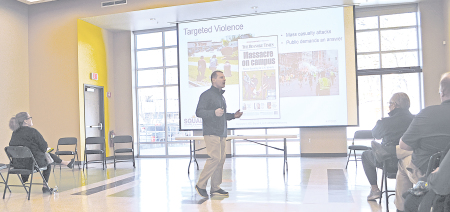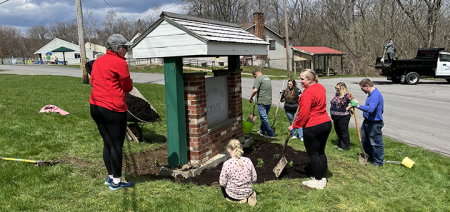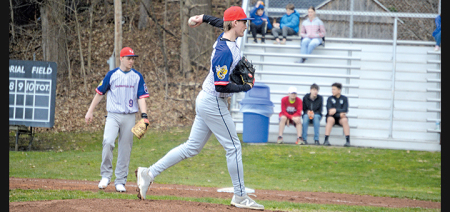Don’t Sweat It, Libraries Are Here For You
Published:
December 14th, 2021
 The Guernsey Memorial Library in Norwich. (Photo by Sarah Genter)
The Guernsey Memorial Library in Norwich. (Photo by Sarah Genter)
By Connie Dalrymple,
Guernsey Memorial Library Director.
The public library is something many of us take for granted. We know it’s there for us if we need a book to read, a video to watch, an Internet connection, or a warm place to hang out for a few hours. This is as deeply as many of us will ever need think about access to the public library.
The library is more important to some of us, however, especially those who have experienced poverty and have no money to purchase cable or Internet access, buy books, subscribe to the newspaper, or take college courses.
Libraries aren’t optional for these folks; they’re a necessity. Libraries are a cornerstone of democracy, ensuring that all people have access to information and opportunities for lifelong learning regardless of their situation in life.
Think, for example, about trying to interact with the state or federal government or apply for a job in recent years without the Internet, which almost every library provides means to do. Access to the public library serves as an equalizer, providing materials and services that help level the playing field for society.
One thing all libraries endeavor to do is to provide access to the broadest range of information. The communities libraries serve are heterogenous; we’re not all white-skinned, republican, christian heterosexuals. Some of us prefer nonfiction.
Some prefer fiction. Some people wouldn’t read a romance novel on a bet, while others gobble them up as fast as they’re published. Among those who do read romances, folks have their favorite genres. The list of popular genres is long – from contemporaries to historicals, from mainstream to LGBTQ+, from suspense to humor, each has its devotees. Libraries try to represent as many opportunities and viewpoints as we can so that people can access them, learn about the diversity of the world around them, and make their own decisions based on exposure to this diversity.
While the library is there to provide access to different viewpoints, we’re also filled with staff who are experts in accessing and interpreting information. Academic libraries are filled with subject specialists in science, sociology, the humanities, etc., so that professors and students are assured of finding the best information to fit their needs.
Most librarians, even in companies, schools, and public libraries, also have degrees and experience in other academic specialties, with an accompanying understanding of how knowledge in their particular field is created, disseminated, accessed, interpreted, and sometimes misconstrued. This means library staff are usually very intellectually curious and great folks to come to when you want help answering questions.
One recent example that comes to mind is a person who came to the library to clarify whether face masks are actually helpful in preventing coronavirus infections. They had heard that the coronavirus is actually small enough to go through masks, making masks ineffective.
Two individuals in Guernsey Memorial Library have science degrees, so this question was right up our alley. This could be an easy question to answer – find out the size of the coronavirus particle and the size particles filtered by various kinds of masks and we’d have the problem solved. We were on it like bloodhounds on the scent.
What we found was interesting. First of all, there’s a whole bunch of information out there on the topic. Everyone from my teenage grand-niece to the top scientists in the world have something to say on the subject of masks and sources range from Facebook memes to peer-reviewed scientific journals. The last I knew my grand-niece doesn’t own the scientific equipment needed to measure a virus particle or know how to access the NIOSH standards on respirators, so the search was narrowed down to the science literature.
Now down to brass tacks. Different masks have differing capacities to filter. The mask everyone has been trying to get their hands on during this pandemic is an N95, which filters 95% of particles 0.3 microns and larger. To the average citizen, a simple search makes it look like these masks would not be effective against coronavirus because the size of the virus at 0.125 microns is smaller than the 0.3 micron size at which N95 masks are 95% effective. Neither librarians nor scientists are the average citizen when it comes to information, however, so we knew to look more deeply into the question.
A deeper search reveals that N95 masks are more efficient at filtering out particles larger than .3 microns (for obvious reasons – they are too large to fit through the holes) AND particles smaller than .3 microns because of Brownian motion (random motion exhibited by tiny particles) and electrostatic charge (negative and positive charges attracting.) So tiny virus particles and the larger droplets of saliva and mucus in which they are travelling are both more than 95% likely to be filtered out by N95 masks.
There’s a lovely explanation of this in the Journal of Hospital Infection, which can be accessed at (www.ncbi.nlm.nih.gov/pmc/articles/PMC7805396/). There are also scientific sources that demonstrate the efficacy of different types of masks. (www.fda.gov/medical-devices/coronavirus-covid-19-and-medical-devices/face-masks-barrier-face-coverings-surgical-masks-and-respirators-covid-19)
Did I mention that library staff are intellectually curious and like bloodhounds on the scent? In the course of our research, we also found lots of other myth-busting resources. Respiratory droplets can be transmitted as far as four meters, which is much farther than the social distancing guidelines of approximately two meters.
(www.ncbi.nlm.nih.gov/pmc/articles/PMC7883189/ ) In addition, respiratory droplets containing the coronavirus can linger in the air for minutes to hours.
(www.epa.gov/coronavirus/indoor-air-and-coronavirus-covid-19) There are also plenty of resources out there that show exactly how efficacious each vaccine is at both preventing contracting COVID-19 and decreasing the likelihood of hospitalization and death.
(www.healthcareitnews.com/news/cdc-publishes-rates-covid-19-cases-deaths-vaccine-brand )
Libraries mean different things to different people. They can be a fun place to go for library programs. Folks can go there to pick up entertaining things to read and watch and listen to. They rent out meeting rooms on the cheap or sometimes for free. They also have materials, resources, and people who can change and save lives. The library is here for you. Let us help.
Comments








